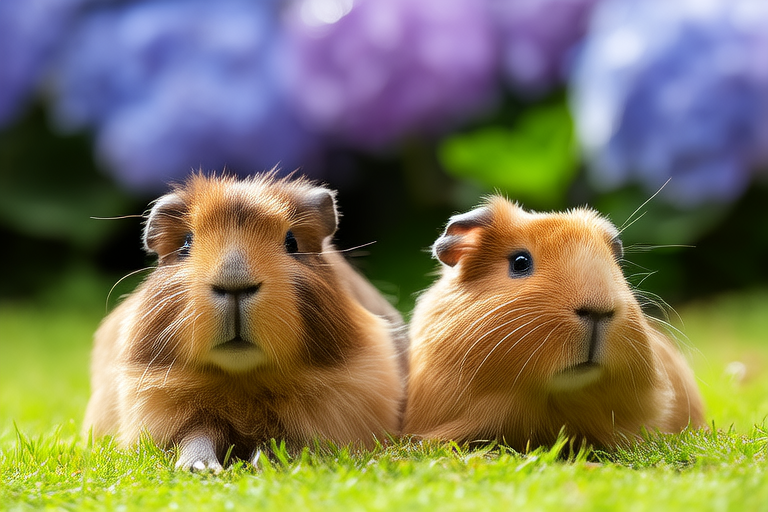Adorable Guinea Pigs: The Ultimate Guide for First-Time Owners
Welcome to the wonderful world of guinea pigs! These delightful creatures are becoming increasingly popular as pets due to their charming personalities and low-maintenance needs. Whether you’re adopting from a shelter or purchasing from a breeder, this guide will help you provide your guinea pig with a happy, healthy life. From selecting the perfect companion to understanding their dietary needs, we’ve got you covered.
Choosing the Right Guinea Pig
When bringing home a guinea pig, it’s important to consider various factors such as breed, age, and temperament. While there are different breeds available, most pet stores carry the American Short-haired variety. Look for a guinea pig that has bright eyes, clean fur, and is active and curious. Avoid any animal showing signs of lethargy, discharge around the eyes or nose, or excessive sneezing. It’s also crucial to ensure the guinea pig is at least four weeks old before taking it home.
Essential Supplies Needed
Your guinea pig’s well-being depends heavily on having the right supplies. Start by investing in a spacious cage with multiple levels and plenty of room for exercise. Opt for a cage measuring at least 7.5 square feet for one guinea pig and add another 4 square feet for each additional pet. Line the bottom of the cage with bedding made from recycled paper or wood pulp, ensuring it’s free of dust and chemicals. Additionally, provide food and water dispensers designed specifically for small animals. Lastly, don’t forget about toys and tunnels; these will keep your pet entertained and mentally stimulated.
Proper Diet
A balanced diet is key to maintaining your guinea pig’s health. Guinea pigs require a constant supply of fresh hay, which should make up the majority of their diet. Timothy hay is ideal for adult guinea pigs, while younger ones may benefit from alfalfa hay. Pellets formulated specifically for guinea pigs should be provided daily in limited quantities, usually 1/8 cup per day. Fresh vegetables like carrots, bell peppers, and leafy greens can be offered in small amounts as treats. Always introduce new foods gradually to prevent digestive upset. Vitamins C-rich foods are especially important since guinea pigs cannot produce their own vitamin C.
Housing Requirements
Guinea pigs need a safe and comfortable living environment. Their cage should be placed away from direct sunlight, drafts, and loud noises. Make sure the area is easily accessible for cleaning purposes. Provide soft bedding material, such as fleece or recycled paper products, to create a cozy sleeping area. Add hiding spots, tunnels, and chew toys to encourage natural behaviors and mental stimulation. Regularly clean the cage by removing soiled bedding and wiping down surfaces with pet-safe disinfectant.
Basic Care Tips
Bonding with your guinea pig is an essential part of owning one. Spend time interacting with them daily through gentle petting sessions and playtime outside of their cage. Handle your guinea pig carefully by supporting its body and avoiding sudden movements. Introduce new foods slowly over several days to avoid digestive issues. Keep their nails trimmed regularly using appropriate clippers and consult a veterinarian if unsure about how to do so safely. Brush their coat weekly to prevent matting and promote healthy skin.
Common Health Issues
Like all animals, guinea pigs can experience various health problems. Respiratory infections, often caused by poor ventilation or overcrowding, are common among guinea pigs. Symptoms include sneezing, nasal discharge, and labored breathing. Dental issues can arise when teeth grow too long or misalign, leading to difficulty eating and drooling. To prevent these issues, ensure your pet has access to plenty of hay and regular veterinary checkups. Other potential concerns include obesity, heatstroke, and gastrointestinal stasis. Early detection and treatment are crucial for recovery.
Fun Facts
Did you know that guinea pigs are social animals? They thrive in pairs or small groups, making them ideal companions for other guinea pigs. Their vocalizations range from chirps and squeaks to purring sounds similar to cats. Some even whistle when excited! Guinea pigs have been used in scientific research for centuries, contributing significantly to medical advancements. Despite their name, they aren’t native to Guinea but were first discovered in South America. Today, they remain beloved pets worldwide.
In conclusion, owning a guinea pig can be a rewarding experience filled with joy and companionship. By following this guide, you’ll be well-equipped to provide your furry friend with everything they need to lead a fulfilling life. Remember to stay informed about proper care techniques and always seek professional advice when necessary. With patience and love, you’ll form a strong bond with your adorable new family member.
